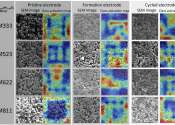Flexible, permeable and 3D integrated electronic skin combines liquid metal circuits with fibrous substrates
In recent years, research teams worldwide have been trying to develop new flexible and soft electronics. These devices could have various potential applications, for instance helping doctors to monitor their patients' health ...









